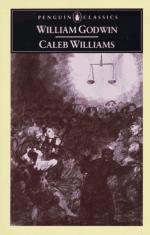|
This section contains 625 words (approx. 3 pages at 300 words per page) |

|
World of Sociology on William Godwin
William Godwin was a controversial British thinker and philosopher whose radical and anarchistic beliefs reflected the idea that all monarchies were "unavoidably corrupt" and that no person should have power over another. He objected to most social institutions, including marriage and the accumulation of private property, and believed that society could solve its problems only through rational discussion and reason.
Godwin was born to John Godwin and Ann Hull Godwin. As a child, he was precocious, and he had read Bunyan's work Pilgrim's Progress by the time he was five. At eleven, Godwin studied under Reverend Samuel Newton, a member of a strict sect of Calvanists who taught that men are depraved and that reason was the only basis for action. Godwin then went to Hoxton Academy until 1778, where he studied under Alexander Kippis. Upon leaving Hoxton, Godwin served as a candidate minister in Christchurch, Ware, and Stowmarket...
|
This section contains 625 words (approx. 3 pages at 300 words per page) |

|


